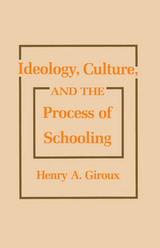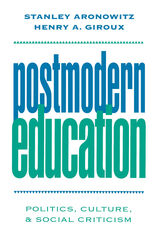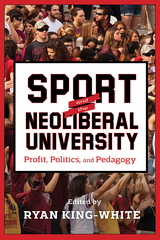3 books about Giroux, Henry

Ideology, Culture and the Process of Schooling
Henry Giroux
Temple University Press, 1984
"Giroux is an articulate, sensitive and balanced spokesperson [who] presents a thoughtful analysis of the relationship between knowledge and power and between social context and the school curriculum."
--Norman Henchey, Journal of Educational Thought
This book lays bare the ideological and political character of the positivist rationality that has been the primary theoretical underpinning of educational research in the United States. These assumptions have expressed themselves in the form and content of curriculum, classroom social relations, classroom cultural artifacts, and the experiences and beliefs of teachers and students. Have existing radical critiques provided the theoretical building blocks for a new theory of pedagogy?
The author attempts to move beyond the abstract, negative characteristics of many radical critiques, which are often based on false dualisms that fail to link structure and intentionally, content and process, ideology and hegemony, etc. He also is critical of the over-determined models of socialization and the abstract celebration of subjectivity that underlies much of the false utopianism of many radical perspectives. Professor Giroux begins to lay the theoretical groundwork for developing a radical pedagogy that connects critical theory with the need for social action in the interest of individual freedom and social reconstruction.
"...a useful and important contribution to the area of curriculum theory. Giroux has articulated well some of the major tensions in radical educational theory and practice without abandoning the concern to establish a foundation for emancipatory cage."
--Walter Feinberg, Journal of Education
"Graduate students, as well as their professors, can learn a great deal from studying Ideology, Culture, and the Process of Schooling; furthermore, the excellent system of notes and references at the end of each chapter will introduce the reader into the world of ideas from which Giroux has taken his lessons."
--Educational Studies
[more]

Postmodern Education
Politics, Culture, and Social Criticism
Stanley Aronowitz
University of Minnesota Press, 1991
The first book to offer a systematic look at the significance of postmodernist ideas for education.
This book offers and opinionated analysis of today's polemics surrounding the topic of education and society. Aronowitz and Giroux present a conceptual framework for charting the future directions educational theory and practice might take and continue the debate begun in their previous book, Education Under Siege, which was named one of the most significant books in education by the American Educational Studies Association in 1986.
"In Postmodern Education Aronowitz and Giroux are architects of the imagination, presenting essays of political, social, and cultural criticism aimed at altering the ways we understand the existing social order and act to change the conditions of our lives." --Afterimage
[more]

Sport and the Neoliberal University
Profit, Politics, and Pedagogy
King-White, Ryan
Rutgers University Press, 2018
College students are now regarded as consumers, not students, and nowhere is the growth and exploitation of the university more obvious than in the realm of college sports, where the evidence is in the stadiums built with corporate money, and the crowded sporting events sponsored by large conglomerates.
The contributors to Sport and the Neoliberal University examine how intercollegiate athletics became a contested terrain of public/private interests. They look at college sports from economic, social, legal, and cultural perspectives to cut through popular mythologies regarding intercollegiate athletics and to advocate for increased clarity about what is going on at a variety of campuses with regard to athletics. Focusing on current issues, including the NCAA, Title IX, recruitment of high school athletes, and the Penn State scandal, among others, Sport and the Neoliberal University shows the different ways institutions, individuals, and corporations are interacting with university athletics in ways that are profoundly shaped by neoliberal ideologies.
The contributors to Sport and the Neoliberal University examine how intercollegiate athletics became a contested terrain of public/private interests. They look at college sports from economic, social, legal, and cultural perspectives to cut through popular mythologies regarding intercollegiate athletics and to advocate for increased clarity about what is going on at a variety of campuses with regard to athletics. Focusing on current issues, including the NCAA, Title IX, recruitment of high school athletes, and the Penn State scandal, among others, Sport and the Neoliberal University shows the different ways institutions, individuals, and corporations are interacting with university athletics in ways that are profoundly shaped by neoliberal ideologies.
[more]
READERS
Browse our collection.
PUBLISHERS
See BiblioVault's publisher services.
STUDENT SERVICES
Files for college accessibility offices.
UChicago Accessibility Resources
home | accessibility | search | about | contact us
BiblioVault ® 2001 - 2024
The University of Chicago Press









